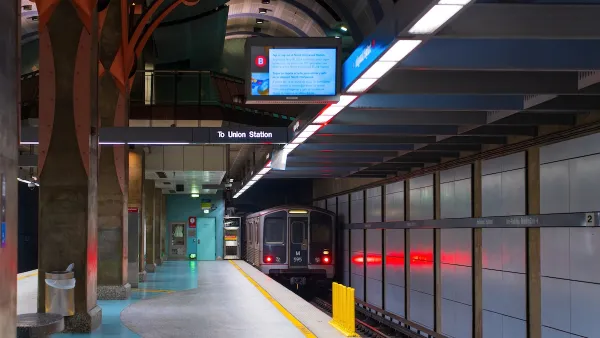A new study of transit use in Los Angeles finds safety concerns are keeping women off of public transit.

"American transit agencies may be grossly underestimating how much safety issues hold back ridership among women," reports Angie Schmitt.
Schmitt is broadcasting the findings of new research presented at the Transportation Research Board Annual Meeting this week.
"A study based in Los Angeles found women were significantly less likely — about half as likely as men — to take advantage of a new rail line near their house," explains Shmitt. "Women are also more likely than men to report fears about crime associated with transit and say they expected it to influence their travel behavior."
Hsin-Ping Hsu from Tamkan University in Taiwan, Marlon Boarnet from the University of Southern California, and Douglas Houston, from the University of California, Irvine, completed the research, which is available to download as a word document.
The researchers surveyed about 200 households and after the Expo Line light rail project opened in 2012. "Those who lived within a half-mile of an Expo station increased their total volume of rail transit trips by 4.3 percent per week," explains Schmitt. "But there was a large gender gap. For women respondents, it was just 2.7 percent."
FULL STORY: Transit Systems Must Address Women’s Safety Concerns

Planetizen Federal Action Tracker
A weekly monitor of how Trump’s orders and actions are impacting planners and planning in America.

Chicago’s Ghost Rails
Just beneath the surface of the modern city lie the remnants of its expansive early 20th-century streetcar system.

San Antonio and Austin are Fusing Into one Massive Megaregion
The region spanning the two central Texas cities is growing fast, posing challenges for local infrastructure and water supplies.

Since Zion's Shuttles Went Electric “The Smog is Gone”
Visitors to Zion National Park can enjoy the canyon via the nation’s first fully electric park shuttle system.

Trump Distributing DOT Safety Funds at 1/10 Rate of Biden
Funds for Safe Streets and other transportation safety and equity programs are being held up by administrative reviews and conflicts with the Trump administration’s priorities.

German Cities Subsidize Taxis for Women Amid Wave of Violence
Free or low-cost taxi rides can help women navigate cities more safely, but critics say the programs don't address the root causes of violence against women.
Urban Design for Planners 1: Software Tools
This six-course series explores essential urban design concepts using open source software and equips planners with the tools they need to participate fully in the urban design process.
Planning for Universal Design
Learn the tools for implementing Universal Design in planning regulations.
planning NEXT
Appalachian Highlands Housing Partners
Mpact (founded as Rail~Volution)
City of Camden Redevelopment Agency
City of Astoria
City of Portland
City of Laramie





























